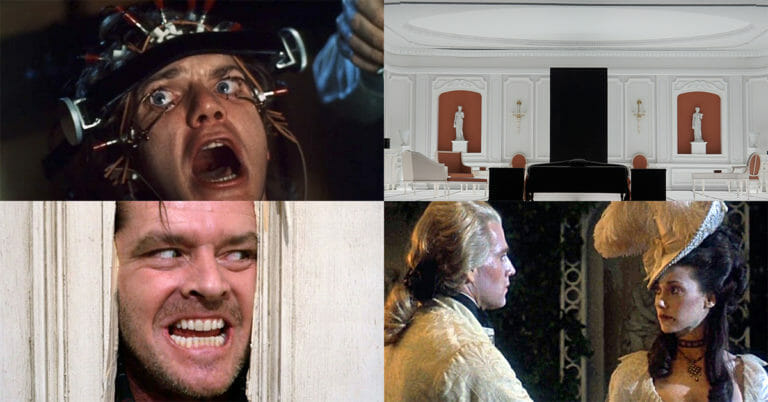By Clare Nina Norelli · March 28, 2018

Classical music—be it Baroque, Romantic, Modernist or the Classical period itself—is rich in its breadth of musical character and dramatic possibility. It also brings with it a plethora of long-held associations for audiences. For these reasons and many more (including the easy licensing of works out of copyright) directors and their music supervisors feel compelled to use it within their films. There has been no greater proponent of the use of Classical music in cinema than the director Stanley Kubrick. Kubrick was obsessive in his filmmaking practice, right down to his scoring choices and the placement of music within his films. It is perhaps for reasons of pedantry that he eschewed collaboration with musicians or composers for the majority of his films, preferring instead to use pre-existing classical works that manifested the mood or pacing he wanted for a scene. However, his desire for greater control did not stop there; he still felt the need to alter the scores, having his music editors manipulate and cut up selected pieces.
Regardless of how you may feel about Kubrick’s disinterest in commissioning new scores, or his apparent “butchering” of the Classics, through his use of pre-existing Classical works within his films he brought attention to music many people might never otherwise hear. A testament to his artful selection and usage, many of the pieces have since become inextricable from the films or scenes he had them accompany.
“The Blue Danube” – Johann Strauss II
Though my favorite use of music in 2001 is the appearance of György Ligeti’s “Kyrie” from his Requiem during the monolith scene, I would be remiss to not include “The Blue Danube” in a selection of Kubrick’s best musical moments. For those who have seen 2001, listening to the buoyant orchestral work will immediately bring forth images in their mind’s eye of our beautiful blue planet floating in space, engaged in a delicate dance with a space station and its occupants.
“The Thieving Magpie (Overture)”- Gioachino Rossini
A Clockwork Orange’s antihero Alex DeLarge is, like Kubrick, incredibly passionate about Classical music. Except when Alex hears a moving Classical work he is compelled not to create, but to destroy, fantasizing about or undertaking acts of “ultraviolence.” In one of the film’s most memorable scenes, Alex and his “droogs” are shown walking by the Flat Block Marina in slow motion. We hear Alex’s narration atop an edited section of the Overture from Rossini’s The Thieving Magpie, which Alex informs us is emanating from a nearby apartment window. Wanting to assert his leadership, Alex is prompted by the music to physically attack Georgie and Dim, and the piece comically underscores the fight that ensues, climaxing as Alex cuts Dim with his knife.
“Sarabande” from Suite in D minor – George Frideric Handel
Barry Lyndon’s soundtrack offers a selection of wonderful Baroque and Classical pieces, most notably George Frederic Handel’s resplendent “Sarabande,” which is featured in the opening credits and appears throughout the film. Leonard Rosenman, who arranged and conducted the works for Barry Lyndon, was awarded the Oscar for “Best Original Song Score” in 1976, though he later complained about the way in which the music was edited into the film. Though Barry Lyndon’s detractors have criticized both its script and the acting skills of some of its cast, the beauty and innovation of its cinematography is undeniable, and when accompanied by Rosenman’s score many of the film’s scenes have remained unforgettable.
“III: Adagio” from Music for Strings, Percussion and Celesta – Bela Bartok
Several scenes in The Shining are scored with the third movement of Bartok’s haunting “Music for Strings, Percussion, and Celesta.” With its ambiguous tonality, creeping rhythms, and slow crescendos, the piece is wonderfully suited to underscore the mounting tension, particularly in a scene in which Danny approaches his increasingly unstable father, Jack. From the moment Danny opens the door to his parent’s room and the opening xylophone motif of Music for Strings… kicks in, mirroring Danny’s tentative entry into the space, the whole scene appears to be dictated by the piece. Initially, Kubrick had wanted no music for the scene, but his music editor Gordon Stainforth suggested Music for Strings…, editing it accordingly to fit the pacing of the scene. Because of Stainforth’s ingenuity, what would otherwise be a rather commonplace conversation between a Father and his son is rendered unnerving due to Bartok’s ominous music.
 Clare Nina Norelli is a composer, musician, teacher and writer. She currently writes Scores on Screen, a column on film music for MUBI’s Notebook and in February of 2017 her first book Soundtrack from Twin Peaks was published as part of Bloomsbury’s 33 1/3 series. You can follow her on twitter @clarenorelli.
Clare Nina Norelli is a composer, musician, teacher and writer. She currently writes Scores on Screen, a column on film music for MUBI’s Notebook and in February of 2017 her first book Soundtrack from Twin Peaks was published as part of Bloomsbury’s 33 1/3 series. You can follow her on twitter @clarenorelli.
For all the latest from The Script Lab, be sure to follow us on Twitter, Facebook, and Instagram.